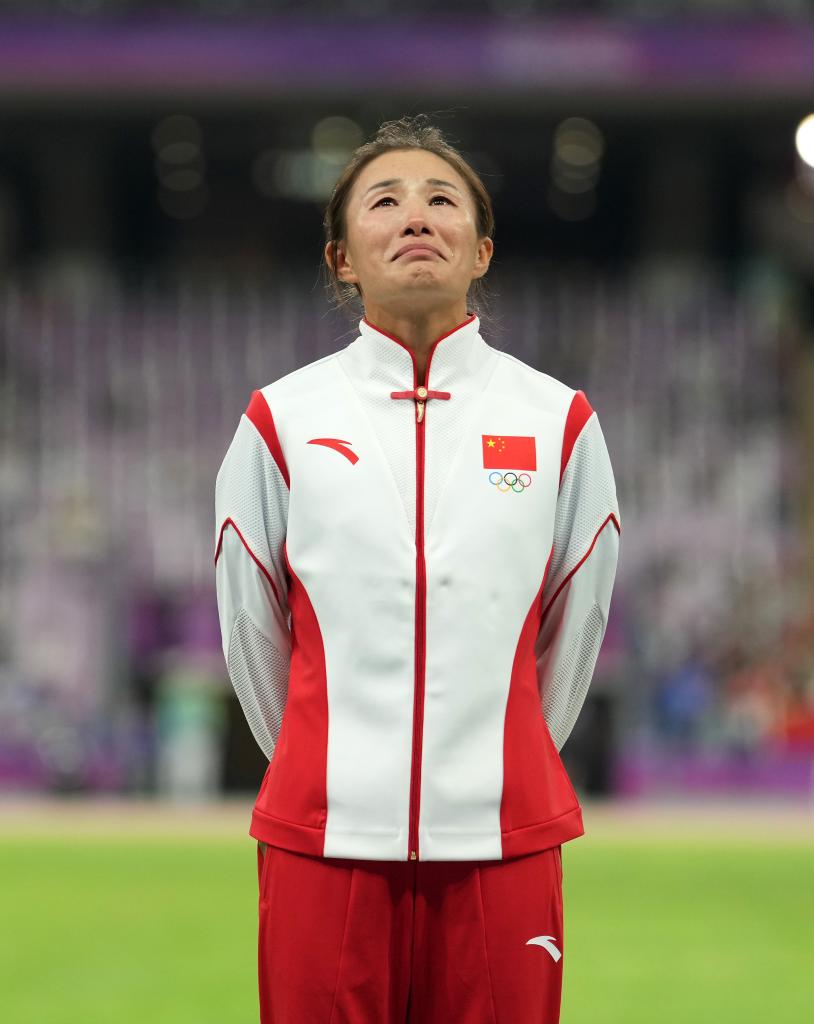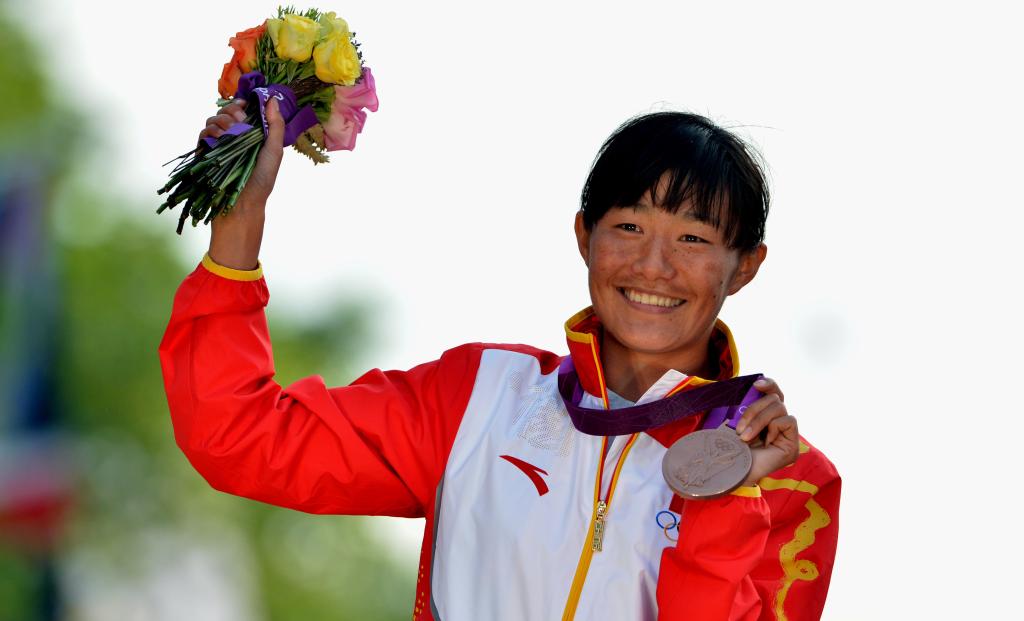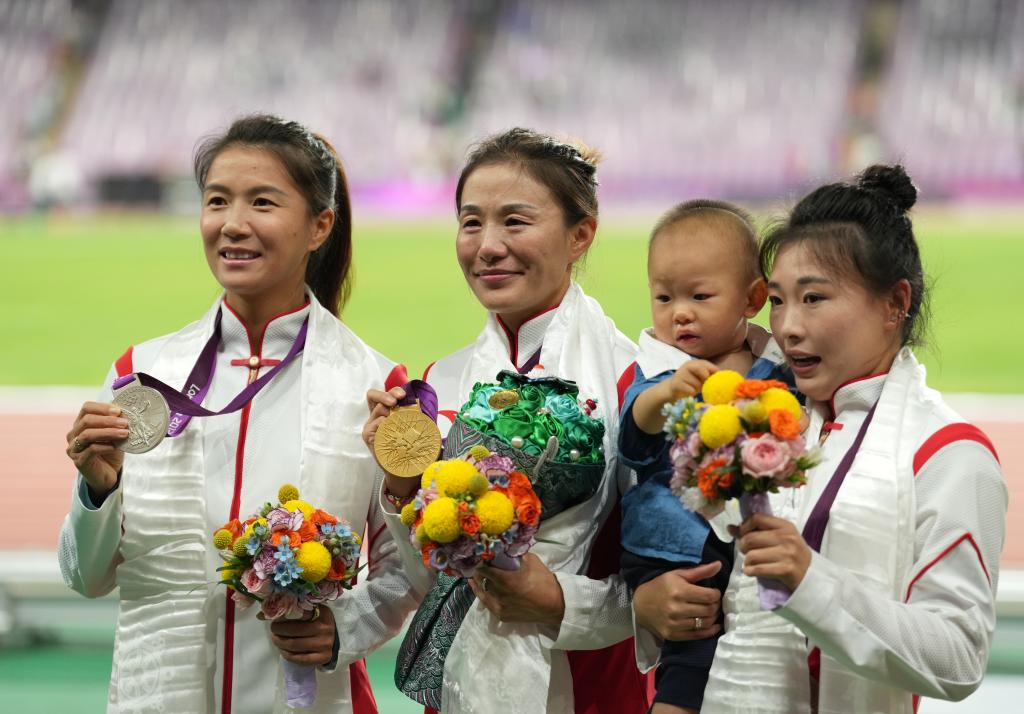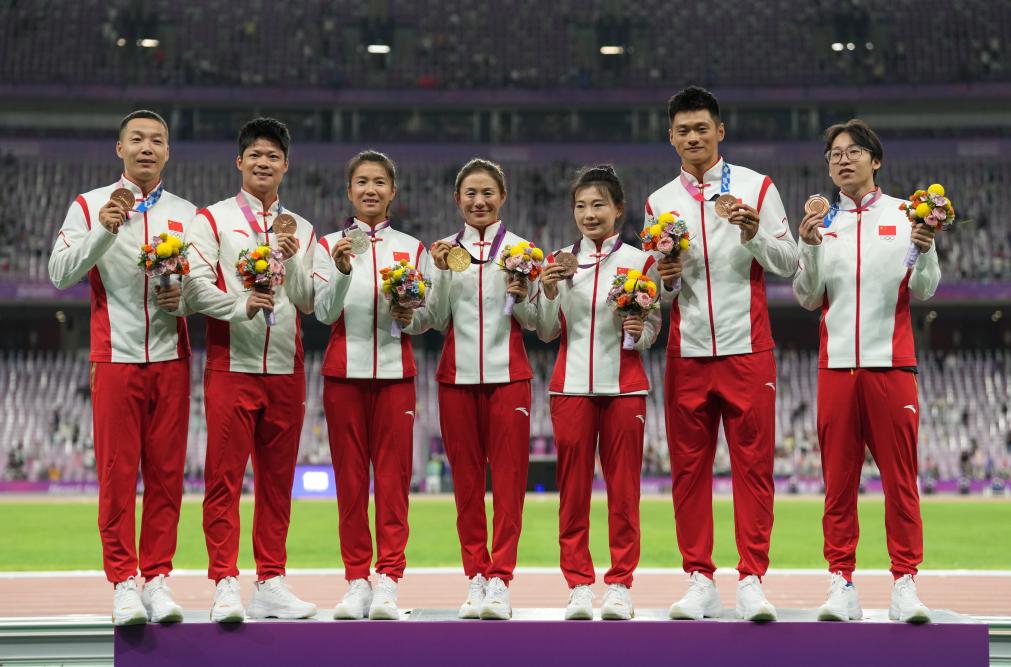Xinhua News Agency, Hangzhou, October 4th (Reporter Wang Haoming, Wu Junkuan, Li Dian, chenchen) The stadium of Hangzhou Olympic Sports Center attracted tens of thousands of people’s attention, and Qieyang Shijie got on the podium. When the national anthem was played, she could no longer hold back and burst into tears.

On October 4th, Qieyang Shijie shed tears at the award ceremony. Xinhua News Agency reporter Sun Fei photo
On the evening of 4th, after the track and field competition of Hangzhou Asian Games, the Chinese Olympic Committee awarded medals to Su Bingtian, Xie Zhenye, Wu Zhiqiang and Tang Xingqiang, who won bronze medals in men’s 4X100 relay at Tokyo Olympic Games, and Qieyang Shijie, Liu Hong and Lv Xiuzhi, who won gold, silver and bronze medals in women’s 20km walk at London Olympic Games in 2012.
Why should Olympic medals be awarded at the Asian Games? Why are these medals so late?
A late medal
For China men’s 4X100 relay team, this medal was "late" for two years.
At the 2021 Tokyo Olympic Games, the men’s 4X100 relay team of China, composed of Su Bingtian, Xie Zhenye, Wu Zhiqiang and Tang Xingqiang, finished fourth in the final, while the Italian team, the British team and the Canadian team won the top three respectively. After the game, Uja, the first baseball player of the British team, was found to have violated the anti-doping regulations.
On February 18th, 2022, the court of arbitration for sports (CAS) announced that the silver medal won by the British team would be deprived.
On May 19th, 2022, the International Olympic Committee held an executive committee meeting in Lausanne to announce that the men’s 4X100 relay team of China track and field won the bronze medal in Tokyo Olympic Games.
For the girls who walk, these three medals have been waiting for 11 years. When the three girls got the medals, the outer skin of the box containing the medals had worn off.

On August 11th, 2012, Qieyang Shijie was on the podium. On the same day, Qieyang Shijie of China won the bronze medal in the women’s 20km walking race at the London Olympic Games with a time of 1 hour, 25 minutes and 16 seconds. Xinhua News Agency reporter Ge Sang Dawa photo
In the 2012 London Olympic Games women’s 20km walking final, Rush Manova of Russia won the championship, another Russian Kaaniche Jinna won the silver medal, Qieyang Shijie of China won the bronze medal, Liu Hong won the fourth place, Kirjapkina of Russia won the fifth place, and Lv Xiuzhi of China ranked sixth. After the game, Kaaniche Jinna and Kierjiapkina were found to have used stimulants, and the results of the London Olympic Games were immediately cancelled. China’s Qieyang Shijie and Liu Hong made up for silver and bronze medals, and Lv Xiuzhi rose to fourth place.
Rush Manova, the champion, was found to be doping positive in 2014, but at that time, the IAAF did not announce the cancellation of her London Olympic results.
Until March, 2022, the track and field integrity committee (AIU), independent of the IAAF, announced that Rush Manova, the gold medal winner of the women’s 20km walk at the 2012 London Olympic Games, would have her performance cancelled that year due to doping problems.
In March this year, the International Olympic Committee announced in official website that the gold medal winner of the 2012 London Olympic Games women’s 20km walk was disqualified due to doping problems. The gold medal was redistributed to Qieyang Shijie of China, while the silver medal and bronze medal were redistributed to Liu Hong and Lv Xiuzhi of China.
Long wait
Many people may have such questions, why do they have to wait so long? Why can’t athletes be deprived of their medals and reissued to other athletes immediately after they are found to have used stimulants?
In fact, for the integrity of the procedure, it takes four steps from the confirmation of doping positive to the reissue of medals. First, legal procedures, which may last for 4-24 months according to different situations; Second, it is the preparation stage of the IOC Executive Committee. The IOC will ask the IFs to confirm the new rankings, which will last for 1-3 months. After that, the IOC Executive Committee made a decision within 1-3 months to approve the redistribution of medals; Finally, it is the redistribution of medals. The IOC informs the Olympic Committee of the country (region) where the athletes are located to arrange the redistribution of medals.

On October 4th, Qieyang Shijie (second from left), Liu Hong (first from left) and Lv Xiuzhi (first from right) took a group photo after the award ceremony. Xinhua News Agency reporter Sun Fei photo
As for the redistribution of medals, according to the regulations of the International Olympic Committee, there are six ways for athletes to choose: in the next Olympic Games, in the Youth Olympic Games, in ioc headquarters or the Olympic Museum, in the related activities of national (regional) Olympic committees, in the related activities of international individual sports organizations and in private ceremonies.
Once the athletes have decided on an award ceremony, the IOC will hold a medal re-award ceremony with the Olympic committees of relevant countries (regions) within one year (unless they choose to receive medals at the next Olympic Games).
This reissue ceremony is hosted by the Chinese Olympic Committee, and it is even more significant to hold it at the Asian Games at home — — In the warm cheers of the audience, seven athletes appeared, and all the procedures of the award ceremony were quite a lot. When the national anthem was played and the national flag was raised, it was like returning to the Olympic Games.
A long-ringing alarm bell
Anyone who is familiar with Qieyang Shijie knows that a gold medal in the World Series is her biggest dream, and she is striving for it.
From standing on the podium to being interviewed by reporters at the end of the award ceremony, Qieyang Shijie never stopped sobbing for an hour, and tears kept trickling down. She said that she was not crying because she was happy, but she was very sad.
In 2022, after learning that he was expected to win the Olympic gold medal, Qieyang Shijie once said on social media: "I was happy and sad after learning the news. I am happy that I can be the champion in my heart. I am happy that I can have the Olympic gold medal. Although many things have passed and I will not have it, I have no medals to prove myself. Sadly, I didn’t feel like a champion, and I didn’t get the aura of the Olympic champion. Although the aura was temporary, I wanted to have the aura at that moment, and I didn’t get my own value, but the past has passed, and I still want to get it. Work hard. "
For Su Bingtian, an Olympic medal is also his dream. At the Tokyo Olympics, after China’s track and field teammate Gong Lixiao won the gold medal in the women’s shot put, Su Bingtian said in an interview: "I especially want to borrow a gold medal from her to take a picture now, because I have never even seen an Olympic medal."

On October 4th, Tang Xingqiang, Xie Zhenye, Lv Xiuzhi, Qieyang Shijie, Liu Hong, Su Bingtian and Wu Zhiqiang (from right to left) were at the award ceremony. Xinhua News Agency reporter Sun Fei photo
For athletes who didn’t violate the rules and missed the honor they should have won at that time, they are undoubtedly victims. Replacing medals will make justice come true, but the shortcomings of the injured athletes may never be made up.
For athletes and participants who use stimulants to "steal" medals, the moment the truth comes out, that is, when their reputation is ruined.
In the 2008 Beijing Olympic Games, syers, a British female javelin thrower, missed the medal by 38 centimeters. Ten years later, in 2018, the International Olympic Committee confirmed that the medal winner at that time was tested positive for drugs, and syers was able to make up for the bronze medal. In the 2019 London Olympic Anniversary Competition, under the attention of the people in her hometown, she boarded her own podium.
When asked if she would resent the opponent who "stole" the medal, syers said, "It’s strange if I don’t blame her at all, but I really feel sorry for her. She never knows what height she can achieve on her own."
This night is a glorious moment for these seven athletes, and it is also an alarm bell that rings again under the Olympic flag.
关于作者